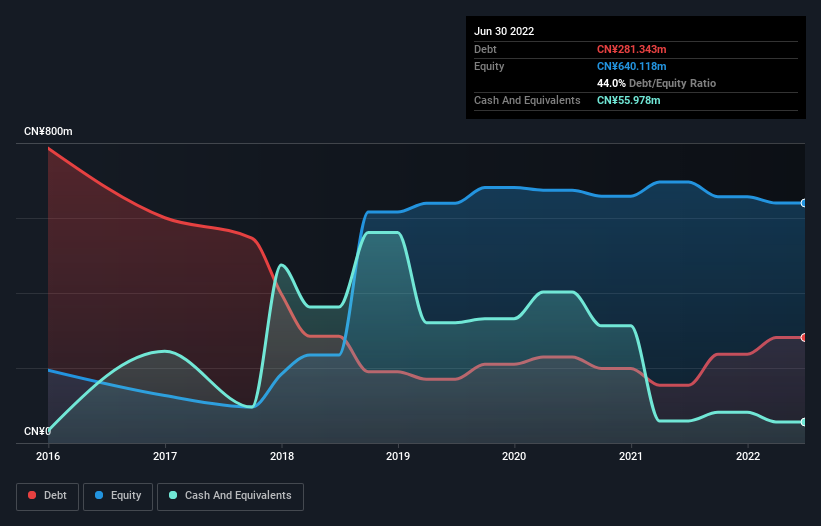Fusen Pharmaceutical (HKG:1652) Use Of Debt Could Be Considered Risky

Warren Buffett famously said, 'Volatility is far from synonymous with risk.' It's only natural to consider a company's balance sheet when you examine how risky it is, since debt is often involved when a business collapses. As with many other companies Fusen Pharmaceutical Company Limited (HKG:1652) makes use of debt. But is this debt a concern to shareholders?
What Risk Does Debt Bring?
Debt and other liabilities become risky for a business when it cannot easily fulfill those obligations, either with free cash flow or by raising capital at an attractive price. Part and parcel of capitalism is the process of 'creative destruction' where failed businesses are mercilessly liquidated by their bankers. However, a more frequent (but still costly) occurrence is where a company must issue shares at bargain-basement prices, permanently diluting shareholders, just to shore up its balance sheet. Of course, plenty of companies use debt to fund growth, without any negative consequences. The first thing to do when considering how much debt a business uses is to look at its cash and debt together.
Check out our latest analysis for Fusen Pharmaceutical
What Is Fusen Pharmaceutical's Net Debt?
The image below, which you can click on for greater detail, shows that at June 2022 Fusen Pharmaceutical had debt of CN¥281.3m, up from CN¥154.1m in one year. On the flip side, it has CN¥56.0m in cash leading to net debt of about CN¥225.4m.

A Look At Fusen Pharmaceutical's Liabilities
We can see from the most recent balance sheet that Fusen Pharmaceutical had liabilities of CN¥487.9m falling due within a year, and liabilities of CN¥90.9m due beyond that. On the other hand, it had cash of CN¥56.0m and CN¥152.9m worth of receivables due within a year. So its liabilities total CN¥370.0m more than the combination of its cash and short-term receivables.
This deficit isn't so bad because Fusen Pharmaceutical is worth CN¥1.13b, and thus could probably raise enough capital to shore up its balance sheet, if the need arose. But it's clear that we should definitely closely examine whether it can manage its debt without dilution.
We measure a company's debt load relative to its earnings power by looking at its net debt divided by its earnings before interest, tax, depreciation, and amortization (EBITDA) and by calculating how easily its earnings before interest and tax (EBIT) cover its interest expense (interest cover). Thus we consider debt relative to earnings both with and without depreciation and amortization expenses.
Fusen Pharmaceutical has a rather high debt to EBITDA ratio of 5.0 which suggests a meaningful debt load. However, its interest coverage of 3.2 is reasonably strong, which is a good sign. Worse, Fusen Pharmaceutical's EBIT was down 77% over the last year. If earnings continue to follow that trajectory, paying off that debt load will be harder than convincing us to run a marathon in the rain. There's no doubt that we learn most about debt from the balance sheet. But you can't view debt in total isolation; since Fusen Pharmaceutical will need earnings to service that debt. So if you're keen to discover more about its earnings, it might be worth checking out this graph of its long term earnings trend.
Finally, while the tax-man may adore accounting profits, lenders only accept cold hard cash. So it's worth checking how much of that EBIT is backed by free cash flow. During the last three years, Fusen Pharmaceutical burned a lot of cash. While that may be a result of expenditure for growth, it does make the debt far more risky.
Our View
On the face of it, Fusen Pharmaceutical's conversion of EBIT to free cash flow left us tentative about the stock, and its EBIT growth rate was no more enticing than the one empty restaurant on the busiest night of the year. But at least its level of total liabilities is not so bad. Overall, it seems to us that Fusen Pharmaceutical's balance sheet is really quite a risk to the business. So we're almost as wary of this stock as a hungry kitten is about falling into its owner's fish pond: once bitten, twice shy, as they say. There's no doubt that we learn most about debt from the balance sheet. However, not all investment risk resides within the balance sheet - far from it. These risks can be hard to spot. Every company has them, and we've spotted 2 warning signs for Fusen Pharmaceutical you should know about.
At the end of the day, it's often better to focus on companies that are free from net debt. You can access our special list of such companies (all with a track record of profit growth). It's free.
New: AI Stock Screener & Alerts
Our new AI Stock Screener scans the market every day to uncover opportunities.
• Dividend Powerhouses (3%+ Yield)
• Undervalued Small Caps with Insider Buying
• High growth Tech and AI Companies
Or build your own from over 50 metrics.
Have feedback on this article? Concerned about the content? Get in touch with us directly. Alternatively, email editorial-team (at) simplywallst.com.
This article by Simply Wall St is general in nature. We provide commentary based on historical data and analyst forecasts only using an unbiased methodology and our articles are not intended to be financial advice. It does not constitute a recommendation to buy or sell any stock, and does not take account of your objectives, or your financial situation. We aim to bring you long-term focused analysis driven by fundamental data. Note that our analysis may not factor in the latest price-sensitive company announcements or qualitative material. Simply Wall St has no position in any stocks mentioned.
About SEHK:1652
Fusen Pharmaceutical
An investment holding company, researches and develops, manufactures, and sells pharmaceutical products in the People’s Republic of China.
Slight and fair value.
Market Insights
Community Narratives



